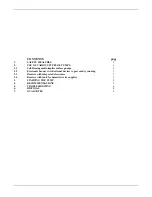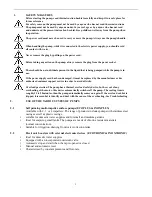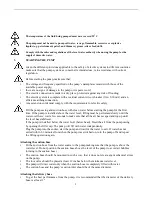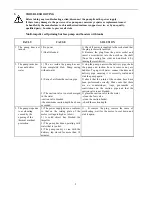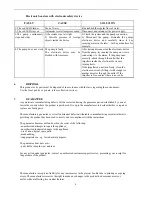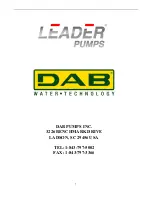
4
The pump will automatically stop if suction does not occur within 120 seconds and will make another two
attempts for another 120 seconds, If at this point the pump does not start, the cause of malfunction must be
detected.
Possible causes are: the suction hose is not in the water or is allowing air to be sucked in (it must be
airtight), the priming connector is not closed properly (air enters), the suction height is excessive (this
depends on the pump used but cannot be more than 26 feet deep), the air cannot escape because the delivery
hose is blocked or it has a double bend (gooseneck), the suction hose does not have a foot valve or the pump
casing and suction hose have not been completely lilled with water prior to the initial use.
lf the pump continuously turns on and off without the water being turned on, the delivery hose or the
connection to the pump may not be sealed properly.
lt may also be that there is a buil up of impurities inside the electronic device that must therefore be
dismantled from the pump and rinsed by spraying water from the inlet.
4.
RECOMMENDATIONS
To ensure the proper operation of the pump, it is important to comply with the following recommendations:
The pump should not operate with the delivery tap completely closed (except for electronically
controlled pumps).
The pump must never be allowed to run dry.
•
The diameter ot the suction and delivery hoses must not be less than the relative inlet or outletof the pump. (1” )
A hose with a greater diameter should ideally be fitted to the suction inlet when the suction height exceeds 12 feet.
Do not use metal connectors on the pump‘s threads.
•
Connect the suction hose including a foot valve avoiding counterslopes, traps, goosenecks and kinks in
the hose.
•
Place the pump in a level, stable and dw place, and away from inflammable or explosive substances.
Never expose the pump to the rain or direct jets of water.
•
Make sure that the mains power connections are not subjectable to flooding, avoid that the pump is
exposed to direct jets of water and do not immerse the pump in water.
•
For boosters with tank: make sure that the preloading pressure ol the tank corresponds to the data
indicated on the pump's rating plate. If necessary, fill the tank with air to the preloading pressure through
the valve after having discharged the air from the delivery side (disconnect from the mains and open the
tap closest to the pump until there is no longer a discharge of water).
MAINTENANCE AND CLEANING
lt is absolutely essential to prevent any risk of the pump freezing. In the event ol freezing temperatures.
remove the pump from the liquid, empty it and keep it in a place where it cannot freeze.
The pump must be disconnected from the mains before performing any cleaning operation.
The pump is maintenance free.



